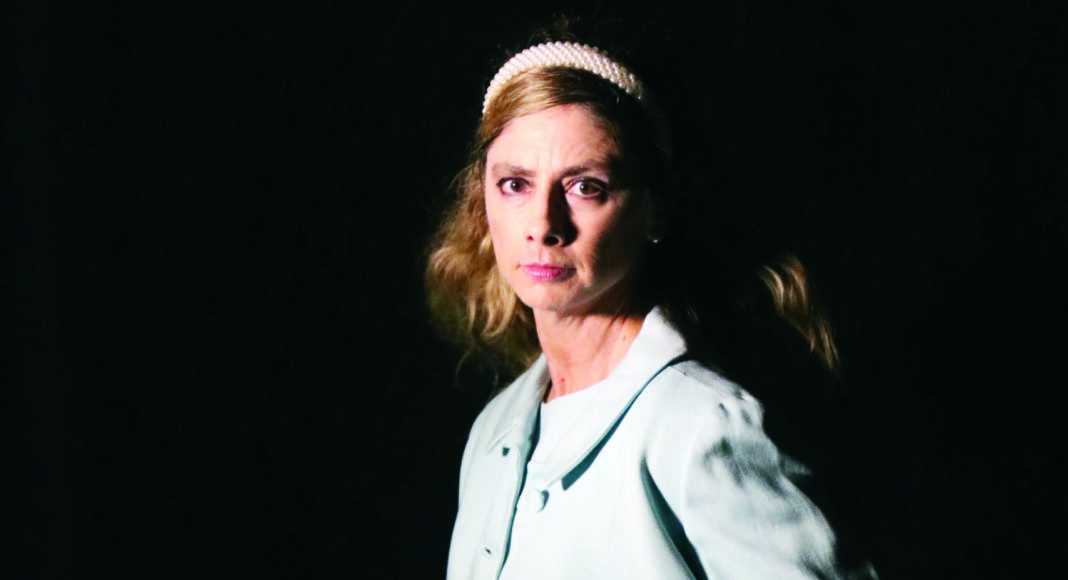There’s something spooky afoot this Halloween season, drawing from a haunting story now over 50 years ago.
Beginning last Friday, San Jose’s Tabard Theatre Company launched its 2022-23 season with a fall production of Wait Until Dark, based on the 1966 play penned by Frederick Knott. The story—adapted into a popular 1967 film starring Audrey Hepburn and Alan Arkin—follows the thrilling, psychological story of a blind woman who faces three male intruders in her own apartment.
Director Rachael Campbell—who directed another domestic chiller in Turn of the Screw for Tabard’s 2021-22 season—said this version of the story has more elements of surprise planned for the audience, and more thrills. To add to the excitement, the play hasn’t been produced in the area for at least six years.
“This play has been on my bucket list to direct for a very long time,” she says.
Jaime Wolf stars as the blind protagonist Susy in the production, a character she calls both “spunky” and “fierce.” She has been interested in the story ever since first watching the film as a teenager.
“She’s not a shrinking violet; she does things for herself, she’s as independent as she can be,” Wolf says. “She’s underestimated because she’s a woman and because she’s blind. So when people can take advantage of her, they’re counting on certain things that don’t prove to be correct.”
Wolf first performed with Tabard Theatre Company in 2005, for the musical Smoke on the Mountain; Wait Until Dark will be her fourth performance with the company. Motivated by the role of Susy, she says she shares the character’s desire to prove others’ assumptions wrong.
“It’s great to see a strong female character who defies the odds in this story—she saves herself, and doesn’t need a man to get this done, which struck me in the 1960s [setting],” Wolf says. “What a great role model.”
Campbell notes that this production is a welcome change to some of the more Victorian-style plays in the Bay Area scene.
“Having something more modern and very different, a little more attainable and realistic, is more frightening than any of the other stories usually told around this time of year,” she says.
Even with the play’s modern feel, there are many parallels between its 1960s time period and today.
“We’re becoming more aware of how to treat each other with kindness, and there was a very similar theme in the 1960s during the Civil Rights movement,” she says. “That is something that will ring very true to people who see the show.”
Assistant director Kimberley Roberts, who previously worked with Tabard as an actor in the 2021-22 season, had Campbell as her director on her first production, Turn of the Screw. Roberts wanted to continue working with Campbell, and to help share the perspective of characters with different life experiences.
“So often, especially in theater, we don’t look at people who are differently abled,” Roberts says. “Being able to show this and how it applies to empathy—and to take a look at different experiences, the show really lets you do that—those differences can become strengths.”
Wait Until Dark takes this into account at a production level, including lighting and scenic design elements where the audience will experience Susy’s perspective. Alongside visual impairments, the production also touches on elements of PTSD and dysfunctional familial relationships.
Tabard also hosted a special performance for audience members with visual impairments on Oct. 22, preceded by a pre-show discussion with the cast. While in rehearsals, the team worked with a consultant from Vista Center for the Blind to help the cast better understand what it means to be blind and to help better portray the experience for the audience.
“How can we make theater a more inclusive experience? We don’t think about some of these other things, so we were honored to work with our consultant,” Roberts says.
Along with centering a differently abled experience, the story lends power back to women, its directors say—especially in a time of peril.
“Having a strong female character in spite of her disability is not often seen,” Campbell says, “at least in theater and especially in thrillers.”
Through Nov 13, Various Times, $35+
Tabard Theatre, San Jose



